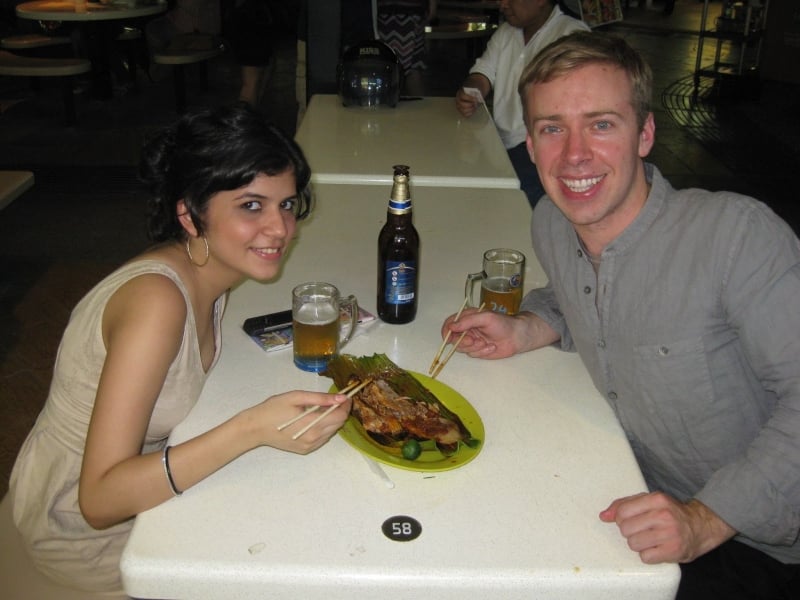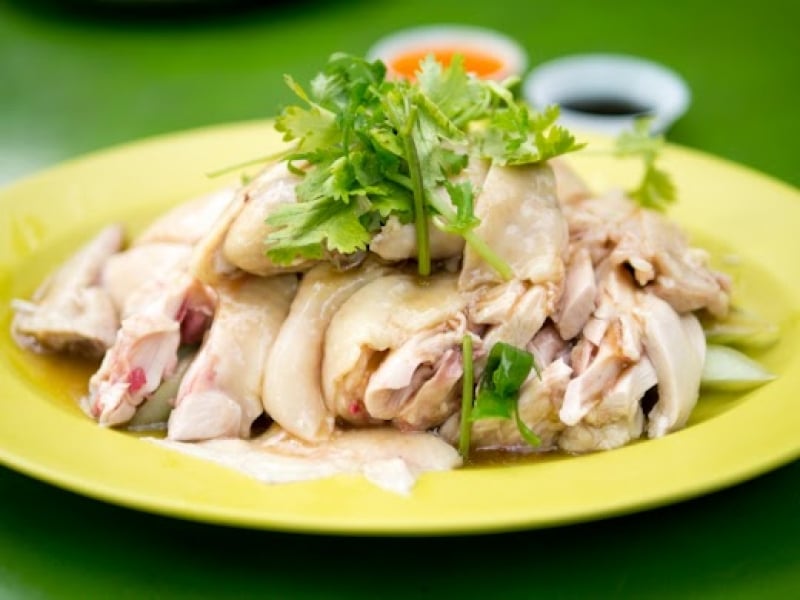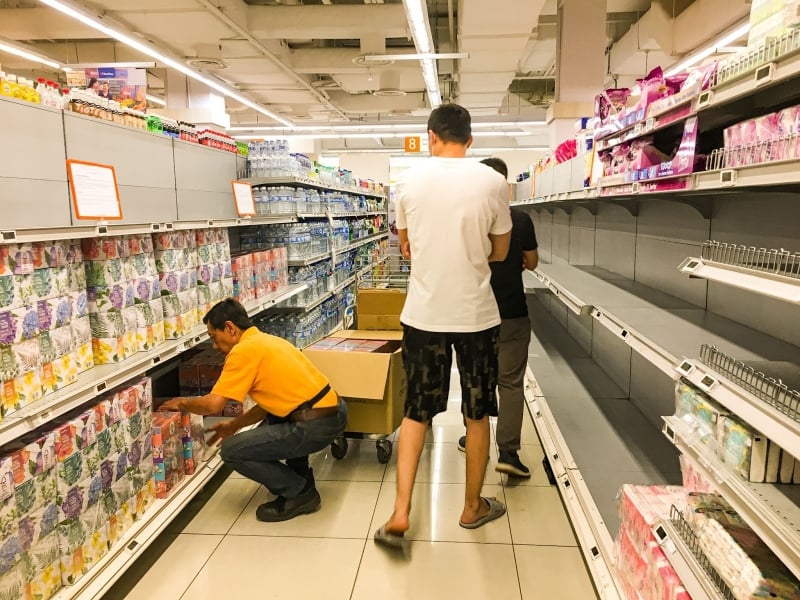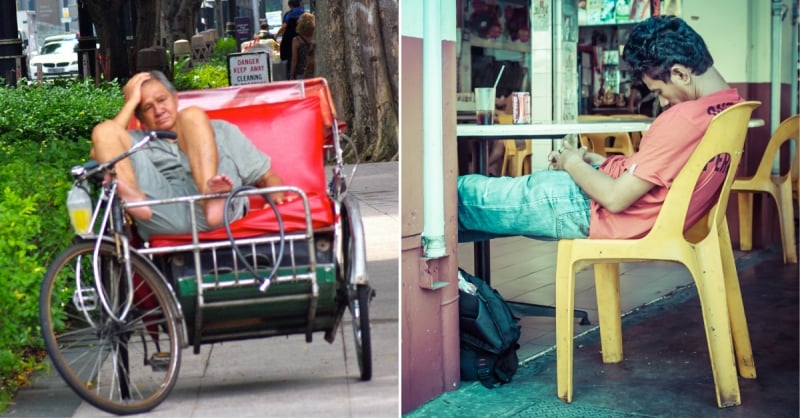Singlish phrases have been a point of interest for many when it comes to learning about Singapore. The culmination of various languages and dialects into a local slang is perhaps something unique only to Singapore, and this might make Singlish seem more challenging than it really is. After all, how many foreigners have been stumped by our ability to draw on multiple languages for a single sentence?
Despite appearing to be complicated, Singlish isn’t as tough as it sounds! Here’s a breakdown of 34 Singlish phrases you should know if you do decide to visit Singapore.
Also read: The Best Things to Do in Singapore, Based on Your Zodiac Sign
1. Shiok

Image credit: Nick Gray
What it means: An expression of pleasure and satisfaction
This is probably a very common slang in Singlish dictionary, and one used quite often. Originally a Malay expression, shiok is often used in a feel-good situation, to express the sense of pleasure or satisfaction over something. As a foreigner, you can use this expression after a particularly satisfying meal.
Example: “The chicken rice was super shiok!”
2. Die die must try

Image credit: Mechie Choa Yu
What it means: The idea that a particular dish is yummy that one must absolutely try it.
Singaporeans easily resonate with a love for food and wanting to share anything absolutely spectacular with as many people as possible.
Example: “Wah, the chicken rice from that stall damn shiok! You die die must try!”
Also read: 15 Best Hawker Food Dishes in Singapore and Where to Find Them
3. Jelak
What it means: To eat something that is cloying, overwhelmingly rich in flavour, or to experience flavour fatigue.
The opposite of shiok, jelak-ness can even happen with dishes we’d usually enjoy: It all depends on how that dish is cooked.
Example: “Alamak, this pasta is too creamy already, damn jelak sia. I cannot finish.”
4. Kiasu
What it means: Afraid to lose
Hokkien is one of the most prevalent Chinese dialects in Singapore, and this is evidenced by the amount of Hokkien phrases that have snuck its way into the Singlish local dictionary. Kiasu is one such example, often used to refer to someone who is being unnecessarily competitive and ambitious. As such, there is a slight negative connotation to this slang. In recent years, it has even been argued that kiasu is a defining characteristic of Singaporeans.

Image credit: cattan2011
With the Covid-19 pandemic, the most recent example of kiasu-ism in Singapore was the idea of “panic buying”: Shelves of grocery stores were emptied to stock up on supplies in response to the Circuit Break announcements back in 2020.
Example:
“She’s so kiasu that she sends her kids to tuition everyday.”
“Wah, FairPrice (one of our local supermarket chains) no more toilet paper leh! Everyone so kiasu that I didn’t manage to buy any!”
5. Kancheong spider
What it means: The noun accompaniment of spoil market (see #6), to be a kancheong spider means that one is overly eager unnecessarily, usually at the expense of others.
This phrase also works interchangeably with kiasu (see #4) most of the time.
Example: “Wah, Brian so kancheong spider (or kiasu) for what? Spoil market sia!”
6. Spoil market
What it means: Usually used as a verb, to spoil market means to overachieve unnecessarily, usually at the expense of others.
What results is a tip in the balance and scale of standard so that it becomes harder for everyone else to achieve. It can work in conjunction with kiasu.
Example: “Wah, Brian so kiasu! This class only need attendance to pass, but he spoil market and ask so many questions for what?”
7. Paiseh
What it means: An expression denoting embarrassment
Find yourself in an awkward or embarrassing situation? You are most probably feeling paiseh. The slang, however, goes beyond simply being embarrassed. It can also be used for circumstances in which you’re feeling shy or a little bit shameful. In some occasions, it is even used as a substitute for “excuse me”.
Example: “Paiseh, I was late cause got traffic jam.”
8. Chope
What it means: To reserve (a seat)
Most noticeably used in hawker centres and food courts, the action of ‘chope-ing’ is often done by leaving a tissue packet, a water bottle, or any other item on the table or seats. So if you see a tissue packet on the table in a hawker centre, you know that those seats are taken. Find another unoccupied table instead!
Example: “Help me chope this table, can?”
9. Bojio
What it means: To not include someone in a social situation
This is another Hokkien phrase that has found its way into Singlish lexicon. Bo means ‘no’, and jio means ‘invite’, so bojio literally means to not invite someone, whether intentionally or otherwise. This phrase is generally used by the person who wasn’t invited to an event or activity.
Example: “Why you bojio me to eat buffet?”
10. Tompang

Image credit: jo.sau
What it means: Usually a verb, to tompang means to hitch a ride from someone.
Example: “Eh bro, can tompang me to Orchard on your way home?”
11. Tapao
What it means: Usually a verb (and not a noun), to tapao means to take away something, usually food.
Or in the rare case, it can refer to something not-so-PG-friendly – to tapao somebody home after a night out.
Example:
To tapao food: “Hello Aunty! I want one chicken rice, roast chicken, tapao!”

Image credit: Galen Crout
Fun fact: An ‘Uncle’ / ‘Aunty’ doesn’t have to be relational – we usually call anyone substantially older than us, usually a friend’s parents or older people in the coffee shop ‘Uncle’ / ‘Aunty’.
To tapao someone: “Eh bro, last night you tapao her home ah?”
12. Buay tahan
What it means: When you cannot tolerate something
A mix of Hokkien and Malay, buay tahan means being unable to withstand or tolerate something. This phrase is a beautiful example to show how the various languages and dialects in Singapore come together to form Singlish as we know today. The word buay comes from Hokkien meaning ‘cannot’, and tahan comes from Malay meaning ‘withstand’, so if someone uses this phrase, you know they are at their limits.
Example: “The weather is so hot, I buay tahan.”
13. Kena
What it means: To have something unpleasant happen (to someone)
A Malay word denoting that something has happened to someone, kena is often used in unpleasant situations due to the negative connotations that it carries. Any attempt at using it in positive situations would be met with confusion.
Example: “I kena detention today because I was late for school.”
14. Catch no ball

Image credit: kwanie
What it means: To not understand (something)
This interesting slang is a direct English translation from a Hokkien phrase, ‘liak bo kiu’. You can use this phrase whenever someone is saying something you don’t understand.
Example: “Just now the lecture, I catch no ball eh.”
15. Sian

Image credit (L-R): L. Allen Brewer; Jirka Matousek
What it means: A feeling of restlessness and boredom.
Sian can also work in relation with catch no ball to signify that one feels bored because they’re unable to keep up with something.
Example: “Wah, the teacher talk for so long already and I catch no ball sia, I damn sian.”
16. Blur (like) sotong
What it means: Someone who is dense or ignorant
This is a phrase with an interesting origin story. Combining the English word blur with the Malay word for squid, blur like sotong is used to refer to someone who is rather dense or has trouble catching on to the situation at hand. This phrase is related to the way a squid’s ink would blur its predator’s vision, thus causing confusion. If someone is said to act blur, it means that they are feigning ignorance.
Example: “He is really a blur sotong, such a simple thing also cannot do!”
17. Machiam
What it means: Like; similar to
Yet another slang taken from the Malay language, machiam is the Singlish version of the word ‘macam’. It can be used when comparing two similar things, events or ideas. Although it may seem redundant when in use, it can actually add emphasis to the sentence being spoken.
Example: “The cake machiam taste like shit.”
18. Confirm plus chop
What it means: To be absolutely sure of something
It isn’t enough just to have Singlish phrases to confirm something; you need a chop that comes with it too — a reference to the ink stamps and seals companies use on official contracts. Another Singlish phrase with a similar meaning is double confirm.
Example: “She didn’t study for the test at all, confirm plus chop going to fail.”
19. Atas
What it means: Fancy; high-class
Taking its roots from the Malay word for ‘up’ or ‘upstairs’, atas is usually used to refer to someone or something being high-class and fancy. It can be used to refer to someone snobby, although that may not always the case.
Example: “I don’t have the budget to eat at an atas restaurant.”
Also read: 6 Exotic Restaurants in Singapore That Let Your Taste Buds Do The Travelling
20. Lepak

Image credit: Philippe Put
What it means: To relax and unwind
Example: “Wah, work was damn tiring this week la, I just want to stay at home and lepak.”
21. Shag

Image credit: Michael Coghlan
What it means: Tired or exhausted
Not at all what you think it means, shag in Singlish is just another word to express fatigue. Since the same word has a sexual connotation in British colloquialism, this is a handy Singaporean slang to learn to avoid finding yourself in some awkward situations.
Example: “I barely slept at all this week, so shag.”
22. Kaypoh
What it means: Busybody
You know how those relatives that love to act all interested in your life despite the fact that you only see them and talk to them once a year? Expect questions like “Do you have a boyfriend/girlfriend?” “When are you going to graduate?” “When are you going to get married?” during these family gatherings. There’s a word in Singlish to describe them — kaypoh. Literally Hokkien for ‘old lady’, kaypoh is used to refer to busybodies who love to poke their nose into everything.
Example: “He keep asking so many questions, so kaypoh!”
23. Talk cock

Image credit: Alexandre Rivest
What it means: To say something ludicrous or nonsensical
No, it’s not what you’re thinking of, neither does it refer to a rooster.
Example: “Don’t worry about what she said bro, she only talk cock.”
24. Sabo
What it means: Sabotage
An abbreviated form of the word ‘sabotage’, sabo in Singapore means to target someone or put them at a disadvantage, often for personal gains. However, unlike ‘sabotage’, sabo can be used in broader situations as well, like when a friend plays a prank on you. Someone who likes to sabotage others often can be referred to as the sabo king.
Example: “My sister sabo me to wash the dishes for this week.”
25. Jialat, or Habis
What it means: These two terms have a very similar meaning – to signify that something disastrous has just happened. It can be also used to signify that something is beyond repair.
Jialat and habis are usually interchangeable with each other.
Example: “Your iPhone drop too many times already bro, jialat (or habis) already la. How to salvage like that?”
26. Alamak
What it means: Our notable Singlish version of “Oh no!”
Example:
Alamak, I’m gonna be late for work! Jialat liao.
Alamak, I’m gonna be late for work! Habis already.
27. Paktor

Image credit: Priscilla Du Preez
What it means: To go on a date with someone.
A term more popular among younger people, I first heard this term back in my primary school days when rumours would spread about two people having a crush on each other.
Example:
“Eh Celeste, you like Kenneth is it? Amanda told me he likes you also! Go confess to him and paktor leh!”
“Eh, you paktor with Celeste yesterday right? How was it bro?”
28. Onz

Image credit: Jonah Brown
What it means: Usually used as an adjective, to be onz is to be up for or keen to participate in something, usually an activity.
It usually prefaces an exciting request that will make both parties happy and strengthen camaraderie between the two. Usually only referred to as ‘on’ elsewhere in the world, as in, “to be on (or excited) about something”, the Singlish version is embellished with a ‘z’ at the end of ‘on’. Why not, right?
Example:
Friend A: “Eh, tonight you want to go drink or not?”
Friend B: “Steady ah bro let’s go, I very onz one!”
29. Rabak

Image credit: Neal E. Johnson
What it means: Usually an adjective, to be rabak means to be the life of the party (and can hedge on being wild); it can also refer to something messed up or chaotic.
I first came across this term in my university days of nightlife and partying. As clubbing and galavanting till 3am is now a thing of the past, the best (and safest) thing to do is to reminisce these fun and enjoyable memories instead.
Example:
Rabak, to be the life of the party: Wah, did you see Josh at the party last night? He damn rabak one sia!
Rabak, to refer to something messed up: Eh bro, your hairdresser anyhow sia, your hair damn rabak.
30. Merlion

Image credit: Jonas Bengtsson
What it means: Used as a verb, to merlion means to vomit endlessly.
With its inspiration from the iconic landmark that characterises Singapore, my exposure to this Singlish phrase is however, not so inspirational. Also originating from my partying days back in university, I remember seeing throngs of people on the streets vomiting after drinking a few too many beers.
Example: Alamak, Ian is gone already la. He merlioning by the roadside cause he drank too much already.
31. Jalan jalan

Image credit: Jeremy Julian
What it means: Used as a verb, jalan jalan means to take a stroll.
This singlish phrase is often used to describe carefree walks, sometimes aimlessly.
Example: Wah I eat until so full already, let’s go Orchard Road jalan jalan.
32. Bopian
What it means: There’s nothing I can do about it
This expression shows one’s helplessness in the present situation.
Example: Boss want me to finish up this project by today ah. Bopian, tonight need to OT already.
33. Nua

Image credit: mr lee
What it means: Used as a verb, nua means to be chill and relaxed.
Derived from the hokkien word for “soft” or “rotten”, it is often used to describe people who are idling and lazy.
Example: Today’s a Sunday, just let me nua on my bed for ten more minutes.
34. Bonus – Pray to the bell curve gods

Image credit: Karl Baron
What it means: This act would usually follow a tough exam: One would hope that there’d be no group of students that’d perform substantially better than everyone else in an exam, raising the average score, thereby making it harder for students to pass the module (or to achieve their desired grade).
Ah, this Singlish phrase certainly never stopped reverberating through the exam halls of my university.
Example: “Alamak bro, the exam was damn hard sia. Better pray to the bell curve gods, hopefully everyone else found it hard also!”
And there you have it, 34 handy Singlish phrases that you can use to impress the locals. Now that you’re more familiar with the local slang, you’re ready to take on Singapore! Go ahead, have as much fun as you want with your new knowledge!
Featured FB image credit (L-R): Michael Elleray; Lily Banse | Flickr; Unsplash




